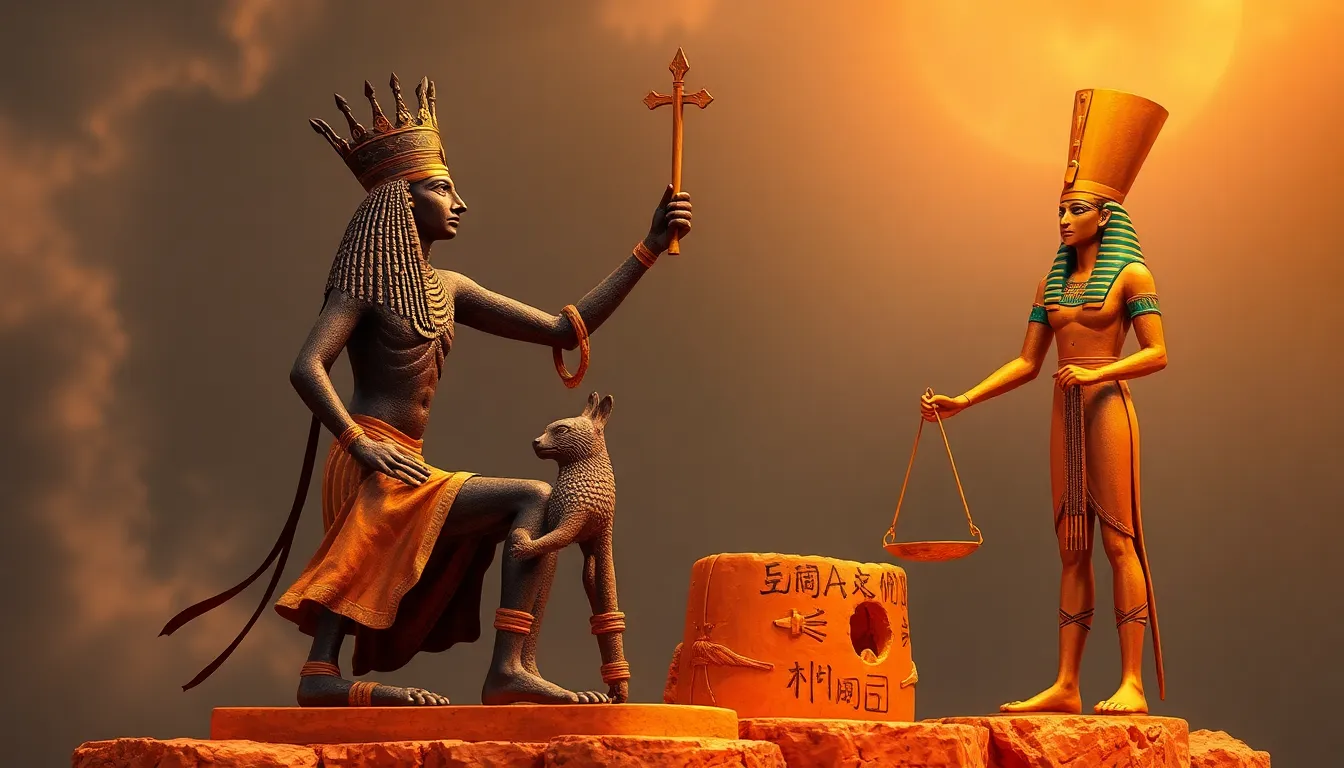The Balance of Ma’at: Justice and Retribution in Egyptian Belief
I. Introduction to Ma’at
In ancient Egyptian culture, Ma’at represented not just a goddess but also a concept that embodied truth, justice, and cosmic order. The term ‘Ma’at’ itself translates to ‘truth’ or ‘justice,’ and it was a fundamental principle that guided the moral, social, and political fabric of Egyptian society.
Historically, Ma’at was integral to the ancient Egyptians’ worldview, influencing their laws, governance, and religious practices. This article aims to delve into the multifaceted aspects of Ma’at, exploring its significance in mythology, its principles, the legal systems of ancient Egypt, and its legacy that resonates even in modern times.
II. The Concept of Ma’at in Egyptian Mythology
Ma’at is personified as a goddess, often depicted with an ostrich feather on her head, symbolizing truth and justice. She embodies the principles of harmony and balance, crucial to both the universe and society.
In creation myths, Ma’at plays a vital role in establishing order from chaos. She is often associated with the sun god Ra, representing the necessary balance between the forces of chaos (represented by the serpent Apep) and the order of the universe.
Ma’at’s relationship with other deities is also significant; she is considered the daughter of Ra and is closely linked to Thoth, the god of wisdom and writing, who preserves her principles. Together, they maintain the cosmic order, ensuring that Ma’at’s values are upheld throughout the universe.
III. The Principles of Ma’at: Truth, Order, and Harmony
The principles of Ma’at encompass several key concepts:
- Truth: The foundation of all that is right and just.
- Order: The structured and organized nature of the cosmos and society.
- Harmony: The balance between opposites, ensuring peace and stability.
These principles guided the everyday lives of ancient Egyptians, influencing moral conduct, social interactions, and community responsibilities. Living in accordance with Ma’at meant adhering to ethical standards and contributing positively to society.
Failing to uphold Ma’at could lead to chaos and disorder, both personally and socially. Thus, the implications of living by Ma’at extended beyond individual morality to the wellbeing of the entire community.
IV. Justice in Ancient Egypt: Legal Systems and Practices
The Egyptian legal system was structured around the principles of Ma’at, reflecting the belief that justice was essential for societal stability. Pharaohs were seen as the earthly embodiments of Ma’at, tasked with maintaining order and justice.
Judges, acting as representatives of Ma’at, were responsible for interpreting laws and making decisions in legal cases. Their judgments were expected to reflect the truth and uphold the cosmic order. The influence of Ma’at on legal decisions was profound, as it ensured that justice was not merely punitive but also restorative.
Examples of legal cases that illustrate the application of Ma’at include:
- Disputes over property rights, where judges would weigh evidence carefully to determine rightful ownership.
- Cases of theft, where the severity of punishment was often related to the offender’s intention and circumstances.
- Family disputes, which were resolved with an emphasis on reconciliation and restoring harmony within the family unit.
V. Retribution and Punishment in Egyptian Belief
Within the framework of Ma’at, retribution was understood as a necessary means to restore balance and justice. Punishments for offenses against Ma’at varied depending on the severity of the crime and the context of the actions. Common types of punishments included:
- Fines or restitution to the offended party.
- Imprisonment for serious offenses.
- Execution for extreme violations, such as murder or treason.
The concept of divine retribution also played a crucial role in societal behavior. Ancient Egyptians believed that the gods would punish wrongdoings, thus reinforcing the importance of living in accordance with Ma’at. The fear of divine consequences served as a deterrent against immoral actions, fostering a sense of accountability within the community.
VI. The Afterlife and Ma’at: Judgment of the Soul
The significance of Ma’at extended beyond mortal life, influencing beliefs about the afterlife. Upon death, a soul would undergo the weighing of the heart ceremony, where the heart of the deceased was weighed against the feather of Ma’at.
This ceremony was critical in determining the fate of the soul. If the heart was found to be lighter than the feather, it indicated a life lived in accordance with Ma’at, allowing the soul to enter the afterlife. Conversely, a heavier heart signified wrongdoing, resulting in the soul facing dire consequences, such as being devoured by the creature Ammit.
The implications of failing the test of Ma’at were severe; it represented not only personal failure but also a disruption of cosmic balance, highlighting the enduring importance of Ma’at in both life and death.
VII. The Legacy of Ma’at in Modern Times
Ma’at’s influence persists in contemporary discussions about justice and morality. Modern legal systems, while different in structure, often echo the principles of Ma’at, emphasizing fairness, truth, and order.
Relevance of Ma’at can be seen in:
- Human rights debates, where notions of justice and equality are paramount.
- Environmental ethics, advocating for balance and harmony between humanity and nature.
- Cultural representations in literature and media, where themes of justice and moral integrity are explored.
VIII. Conclusion
In summary, Ma’at encapsulates the essence of justice and retribution within ancient Egyptian belief systems. The principles of truth, order, and harmony shaped not only the legal practices of the time but also the moral compass of society.
Reflecting on the enduring significance of Ma’at reveals its profound impact on contemporary notions of justice and morality. As societies continue to navigate complex ethical dilemmas, the balance of justice and retribution remains a vital consideration, echoing the teachings of Ma’at throughout history.
Ultimately, the legacy of Ma’at serves as a reminder of the importance of striving for balance and integrity in human society.




